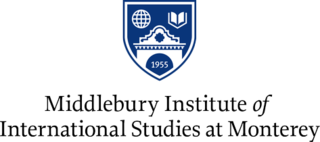Related Research Articles

The Treaty on the Non-Proliferation of Nuclear Weapons, commonly known as the Non-Proliferation Treaty or NPT, is an international treaty whose objective is to prevent the spread of nuclear weapons and weapons technology, to promote cooperation in the peaceful uses of nuclear energy, and to further the goal of achieving nuclear disarmament and general and complete disarmament. Between 1965 and 1968, the treaty was negotiated by the Eighteen Nation Committee on Disarmament, a United Nations-sponsored organization based in Geneva, Switzerland.

Nuclear disarmament is the act of reducing or eliminating nuclear weapons. Its end state can also be a nuclear-weapons-free world, in which nuclear weapons are completely eliminated. The term denuclearization is also used to describe the process leading to complete nuclear disarmament.

In nuclear ethics and deterrence theory, no first use (NFU) refers to a type of pledge or policy wherein a nuclear power formally refrains from the use of nuclear weapons or other weapons of mass destruction (WMD) in warfare, except for as a second strike in retaliation to an attack by an enemy power using WMD. Such a pledge would allow for a unique state of affairs in which a given nuclear power can be engaged in a conflict of conventional weaponry while it formally forswears any of the strategic advantages of nuclear weapons, provided the enemy power does not possess or utilize any such weapons of their own. The concept is primarily invoked in reference to nuclear mutually assured destruction but has also been applied to chemical and biological warfare, as is the case of the official WMD policy of India.

As the collapse of the Soviet Union appeared imminent, the United States and their NATO allies grew concerned of the risk of nuclear weapons held in the Soviet republics falling into enemy hands. The Cooperative Threat Reduction (CTR) program was initiated by the Nunn–Lugar Act, which was authored and cosponsored by Sens. Sam Nunn (D-GA) and Richard Lugar (R-IN). According to the CTR website, the purpose of the CTR Program was originally "to secure and dismantle weapons of mass destruction and their associated infrastructure in former Soviet Union states." As the peace dividend grew old, an alternative 2009 explanation of the program was "to secure and dismantle weapons of mass destruction in states of the former Soviet Union and beyond". The CTR program funds have been disbursed since 1997 by the Defense Threat Reduction Agency (DTRA).

Jon Wolfsthal is an American security analyst currently serving as director of global risk at the Federation of American Scientists.
Civilian Research and Development Foundation (CRDF) Global is an independent nonprofit organization that promotes safety, security, and sustainability through science and innovation. CRDF Global was authorized by the U.S. Congress in 1992 under the FREEDOM Support Act and established in 1995 by the National Science Foundation. This unique public-private partnership promotes international scientific and technical collaboration through grants, technical resources, and training. CRDF Global was originally named the U.S. Civilian Research and Development Foundation for the Independent States of the Former Soviet Union (CRDF).

The Middlebury Institute of International Studies at Monterey (MIIS), formerly the Monterey Institute of International Studies, is a graduate institute of Middlebury College, a private college in Middlebury, Vermont. Established in 1955, the school provides instruction on a campus in Monterey, California. The institute offers master's programs and certificates in environmental policy, international policy, language teaching, and translation and interpretation. It is host to several related centers.

Gloria Charmian Duffy is a former U.S. Department of Defense official, businesswoman, social entrepreneur and nonprofit executive. Since 1996, she has been the president, CEO and a member of the Board of Governors of the Commonwealth Club of California, America's largest and oldest public forum, founded in 1903. From 2010 to 2017 she led the acquisition, financing, design, entitlements and construction of the club's first headquarters building, at 110 The Embarcadero in San Francisco. The grand opening for the club's new building took place on September 12, 2017. The building received a 2016 California Heritage Council award for historic preservation.
The International Conference on Nuclear Disarmament took place in Oslo on 26 and 27 February 2008. It was organized by The Government of Norway, the Norwegian Radiation Protection Authority in collaboration with the NTI and the Hoover Institute. The Conference, entitled "Achieving the Vision of a World Free of Nuclear Weapons", had the purpose of building consensus between nuclear weapon states and non-nuclear weapon states and about the importance of all the actions in the NPT.

Angela Kane is a German diplomat and was formerly the UN High Representative for Disarmament Affairs and Under-Secretary-General for Management in the United Nations.
The International Luxembourg Forum on Preventing Nuclear Catastrophe — is an international non-governmental organisation uniting leading world-renowned experts on non-proliferation of nuclear weapons, materials and delivery vehicles.

Jessica Eve Stern is an American scholar and academic on terrorism. Stern serves as a research professor at the Pardee School of Global Studies at Boston University. Earlier she had been a lecturer at Harvard University. She serves on the Hoover Institution Task Force on National Security and Law. In 2001, she was featured in Time magazine's series on Innovators. In 2009, she was awarded a Guggenheim Fellowship for her work on trauma and violence. Her book ISIS: The State of Terror (2015), was co-authored with J.M. Berger.

The 2010 Nuclear Security Summit was a summit held in Washington, D.C., on April 12 and 13, 2010. The Summit focused on how to better safeguard weapons-grade plutonium and uranium to prevent nuclear terrorism.
The 2010 Review Conference for the Treaty on the Non-Proliferation of Nuclear Weapons (NPT) was held at United Nations Headquarters in New York City from 3 to 28 May 2010. The President of the Review Conference is Ambassador Libran N. Cabactulan of the Philippines. UN Secretary-General Ban Ki-moon used the opening of the conference to note that "sixty five years later, the world still lives under the nuclear shadow".

Bonnie Denise Jenkins is an expert on arms control and nonproliferation of weapons of mass destruction and currently serves as the under secretary of state for arms control and international security affairs. During the Obama administration, she was the U.S. Department of State's coordinator for threat reduction programs in the Bureau of International Security and Nonproliferation.
George Bunn was an American diplomat, lawyer, and nonproliferation expert. He drafted the legislation that created the U.S. Arms Control and Disarmament Agency (ACDA), was one of the lead U.S. negotiators of the nuclear Nonproliferation Treaty (NPT), served as Dean of the law school at the University of Wisconsin–Madison, and spent the last two decades of his career at the Center for International Security and Cooperation at Stanford University.

European Leadership Network (ELN) is a pan-European think-tank focusing on European foreign, defence and security issues based in London, United Kingdom. The ELN's Director is Sir Adam Thomson, former UK Permanent Representative to NATO.

Alexei Georgievich Arbatov is a full member of the Russian Academy of Sciences, the Head of the Center for International Security at the Institute of World Economy and International Relations (IMEMO), and a scholar in residence at the Carnegie Moscow Center. He is a Russian political scientist, academic, author, and former politician.
Jeffrey Lewis is an American expert in nuclear nonproliferation and geopolitics, currently a professor at the James Martin Center for Nonproliferation Studies at the Middlebury Institute of International Studies at Monterey, and director of the CNS East Asia Nonproliferation Program. He has written two books on China's nuclear weapons, and numerous journal and magazine articles, blog posts, and podcasts on nonproliferation and related topics.
References
- ↑ "Dr William Potter". www.europeanleadershipnetwork.org. Retrieved 2022-08-08.
- ↑ "William Potter". American Academy of Arts & Sciences. Retrieved 2022-08-07.
- ↑ Doyle, James (2011-04-08). Nuclear Safeguards, Security and Nonproliferation: Achieving Security with Technology and Policy. Elsevier. ISBN 978-0-08-088811-8.
- ↑ "Global Catastrophic Risks". www.global-catastrophic-risks.com. Retrieved 2022-08-08.
- ↑ "Dr William Potter". www.europeanleadershipnetwork.org. Retrieved 2022-08-08.
- ↑ "CNS Director Bill Potter Elected to Russian Academy of Sciences | Middlebury Institute of International Studies at Monterey".